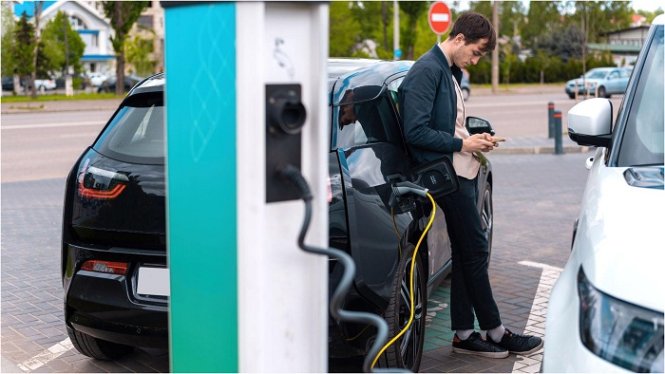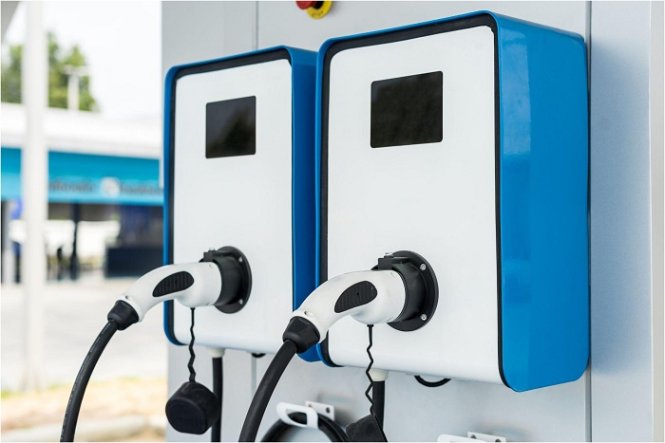Are you considering entering the expanding electric vehicle (EV) charging business? That’s a smart move, as EVs are set to dominate the automotive market soon.
But before you dive headfirst into this venture, there are several critical factors that you must weigh. This article provides key insights to help you start an effective EV charging business.

Let’s get into it!
1. Understanding the Electric Vehicle Market
You need to know who’s buying EVs, what they’re looking for in charging infrastructure, and how often they will use it. Consider emerging trends like rising EV sales or cities implementing green initiatives promoting EV use. It’s also crucial to understand the competitive landscape. Who are the big players? What unique services do they offer?
The more you learn about your potential customers and competitors, the better decisions you’ll make when setting up your own charging business. This process will help you find out more about EV charging station benefits for your consumers and accommodate them in the best possible way.
2. Identifying Your Target Audience
Understanding who’ll be using your services is a crucial step in setting up any successful venture. Your primary audience in the EV charging business will likely be electric vehicle owners. However, don’t limit yourself to this group alone. Consider other potential customers like businesses looking for workplace charging solutions or property managers interested in providing charging stations to tenants.
It’s important to research your target market thoroughly. What are their needs and preferences? Are they concerned about charging speed, availability of stations, or price? Use surveys, focus groups, or direct interviews to gather this information.
3. Selecting the Right Location
Location’s everything when setting up your EV charging stations. Choose a spot that’s easy to access and frequented by EV drivers. Think about places where people leave their cars for extended periods, like shopping centers, office parks, or residential communities.
Consider traffic patterns and future demographic trends too. You’ll want your charging stations in areas with high footfall and growing populations of EV owners. Don’t forget regulatory constraints either – make sure you know local zoning laws and building codes before settling on a location.
Lastly, think about visibility. Your station should be easy to find for existing customers and potential new ones. A well-placed EV charging station can become a landmark in its own right!
4. Deciding on the Types of Chargers

Once you’ve nailed down the perfect spot, it’s time to delve into the nitty-gritty – deciding on what chargers to install. This decision will largely depend on your target market. If you’re aiming for residential users or businesses with long parking hours, consider Level 2 chargers. They’re slower but cheaper and great for overnight charging.
On the other hand, if your location is near highways or commercial areas where drivers need quick top-ups, fast DC chargers are your best bet. They can charge a vehicle in under an hour but with a higher price tag. Also, consider future electric vehicle trends; installing high-capacity chargers could be beneficial in the long run as newer EV models with larger batteries become more popular.
5. Pricing Strategy Development
Crafting a smart pricing strategy can make or break your venture’s success, so you must get it right. Start by understanding the costs of setting up and running an EV charging station. This includes equipment costs, installation expenses, maintenance fees, and electricity costs.
Next, research what competitors charge to ensure your prices are competitive yet profitable. Remember that consumers want value for their money. Additional services such as fast charging options or superior customer service could justify higher prices.
Finally, consider dynamic pricing, where charges vary depending on demand or time of day. This could maximize your profits during peak periods while still attracting customers during off-peak times. It’s all about finding a balance that works for you and your customers.
6. Complying with Legal and Regulatory Requirements
Navigating regulations can be complex, but you can’t ignore them. They exist to ensure safety, fairness, and reliability in the marketplace. You’ll need to familiarize yourself with local zoning laws, building codes, and environmental guidelines that may influence where and how you can set up charging stations.
It is also important to understand national regulations concerning energy provision and usage. Consult with a knowledgeable attorney who specializes in this area. Maintaining compliance isn’t just about avoiding penalties; it’s also about safeguarding your reputation and promoting trust among your customers.
7. Building Partnerships with EV Manufacturers
Alliances with EV manufacturers could be a game-changer in your journey. Partnering up can facilitate the integration of charging stations and vehicles, enhancing user experience. You’d also gain exclusive insights into upcoming EV models and their charging requirements.
In addition, these partnerships could open doors for co-marketing opportunities, allowing you to reach a bigger audience. Imagine your charging stations being recommended by popular EV brands! Also, having the backing of an established manufacturer might attract investors or convince potential clients about your business’s viability.
However, partnering doesn’t mean losing control over your business decisions. Ensure any agreement aligns with your company’s vision and values while mutually benefiting both parties.
8. Crafting a Marketing and Promotional Plan
Use social media platforms, local events, and ads in newspapers or radio stations to get the word out. Consider offering promotions or discounts as an incentive for first-time users.
Partnering with local businesses to offer charging station services at their locations can be a win-win situation. Remember, a well-crafted marketing strategy attracts customers and builds brand loyalty over time. So do it right from the start!
9. Implementing Effective Customer Service
When things go wrong, as they occasionally will, having a well-trained team ready to resolve issues promptly and professionally can set your EV charging business apart. Bear in mind effective customer service extends beyond solving problems. It means proactively anticipating potential issues before they arise and ensuring customers understand how to use your stations.
Solicit feedback regularly and be responsive, showing clients you value their opinions. An excellent reputation for customer service can drive repeat business and referrals. So train your staff thoroughly, maintain open communication lines with customers, and strive for continuous improvement in this area.
10. Analyzing and Adapting Your Business Model
You’ll find that regularly reviewing and adjusting your business model is crucial to staying competitive and profitable in this fast-paced industry. This isn’t just about keeping up with the latest trends. It’s about adapting to technological changes, regulations, customer behavior, and market dynamics.
Start by analyzing your current operations. Are you maximizing profits? If not, identify areas of inefficiency or waste. Also, consider if your pricing structure aligns with consumer demand and the cost of services. An oversimplified or overly complex pricing can drive customers away.
Keep an eye on competitors too. What are they doing differently? Can their strategies work for you? And always be open to innovation – new products or services could give you a competitive edge.
Start a Profitable EV Charging Business and Contribute to a Greener Future
Starting an EV charging business allows you to be a part of the eco-friendly transportation movement and shake up the automotive industry. How exciting is that? As you embark on this journey, consider these ten crucial factors to charge ahead and thrive in this dynamic industry.
We wish you the best of luck!

